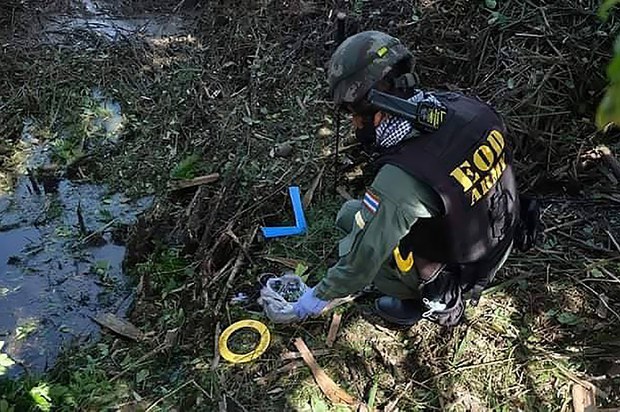Thailand: Soldiers Killed, Injured in Deep South Bomb Attacks
2020.08.13
Pattani and Narathiwat, Thailand
 A Thai Army explosive ordnance disposal officer inspects the bomb site near a road in Pattani province where suspected insurgents killed a soldier, Aug. 13, 2020.
A Thai Army explosive ordnance disposal officer inspects the bomb site near a road in Pattani province where suspected insurgents killed a soldier, Aug. 13, 2020.
Two soldiers were killed and three others injured in a pair of roadside bombings Thursday in Thailand’s insurgency-stricken Deep South as they escorted teachers and students to schools for the start of the academic year, authorities said.
Officials blamed separatist rebels for the attacks in Pattani and Narathiwat provinces, the first deadly bombings in the southern border region since a soldier died in an explosion in mid-July. And although insurgents in the past have targeted schools or security details escorting teachers and students to class, the twin incidents on Thursday were the first such attacks since schools in the Deep South reopened for in-person instruction after the COVID-19 outbreak.
The chief of the Duyong police station in Pattani said the first attack took place shortly after 8 a.m. as a dozen soldiers assigned to Company 4305 were patrolling a road leading to Pakaluesong primary school.
“They had spaced themselves 10 yards from each other. The assailants used a radio signal to trigger an IED [improvised explosive device], killing M-lukeman Haji-samae,” police Col. Wasan Rakchartpanich, chief of Duyong police station, told reporters. He blamed insurgents for the attack.
About 30 minutes later, a squad assigned Company 4508, in Ra-ngae, a district in Narathiwat, came under a similar attack.
Soldiers patrolling a road to Kaliza primary school were struck by a bomb as they were approaching a bridge, said police Lt. Col. Worapol Sukkaew, an investigator at Ra-ngae police station.
“The homemade bomb hidden in fertilizer sack planted near the bridge was detonated by a radio signal,” said Worapol, adding that one soldier was killed and three others were injured.
The attacks appeared to be coordinated to explode simultaneously, Police Lt. Gen. Ronasilp Poosara, the commander of Region 9 Police Bureau, told reporters.
“The attacks in Pattani and Narathiwat are linked with an effort to make them happen at the same time, different cells but they were set off by insurgents who wanted to disrupt the peace,” Ronasilp said.
Another official, who asked not to be named because he was not authorized to speak to reporters, said the attackers were led by Arong Due-rapo and Aria Jehteh, two local insurgent leaders.
On July 14 and 15, back-to-back blasts in Pattani killed a soldier and injured at least six others, along with four members of a family.
Attacks by insurgents on schools in the region have also long been a threat.
In September 2019, assailants shot and killed a village chief in Pattani province on the same day that gunmen fired at a school building in Yala province. In February 2019, an explosion in Yala province killed a soldier who was providing security for a small school.
After the attacks on Thursday, Lt. Gen. Pornsak Poonsawat, the army’s regional commander, told reporters that he had ordered tactical teams to step up pressure on insurgents.
“We anticipated attacks on the first school day. School defense squads are vulnerable,” he said. “From now on we will be more proactive with tactical mobile teams by striking against insurgent jungle hideouts or at the homes of their supporters.”
Since the National Revolutionary Front (BRN), the largest of the armed separatist groups in the Deep South, declared a unilateral ceasefire in early April to allow officials to deal with the COVID-19 pandemic, at least 33 attacks have occurred in the border region. These have resulted in the deaths of at least 19 people, including five insurgents. As many as 52 people have been injured in those incidents, according to information compiled by BenarNews from police reports.
In 2004, Malay-speaking rebels in the Muslim-majority provinces of Pattani, Yala, Narathiwat and four districts in Songkhla province reignited an insurgency against Thai security forces and soft targets over their demand for an independent state. More than 7,000 people have been killed since then, according to Deep South Watch, a local think-tank.







